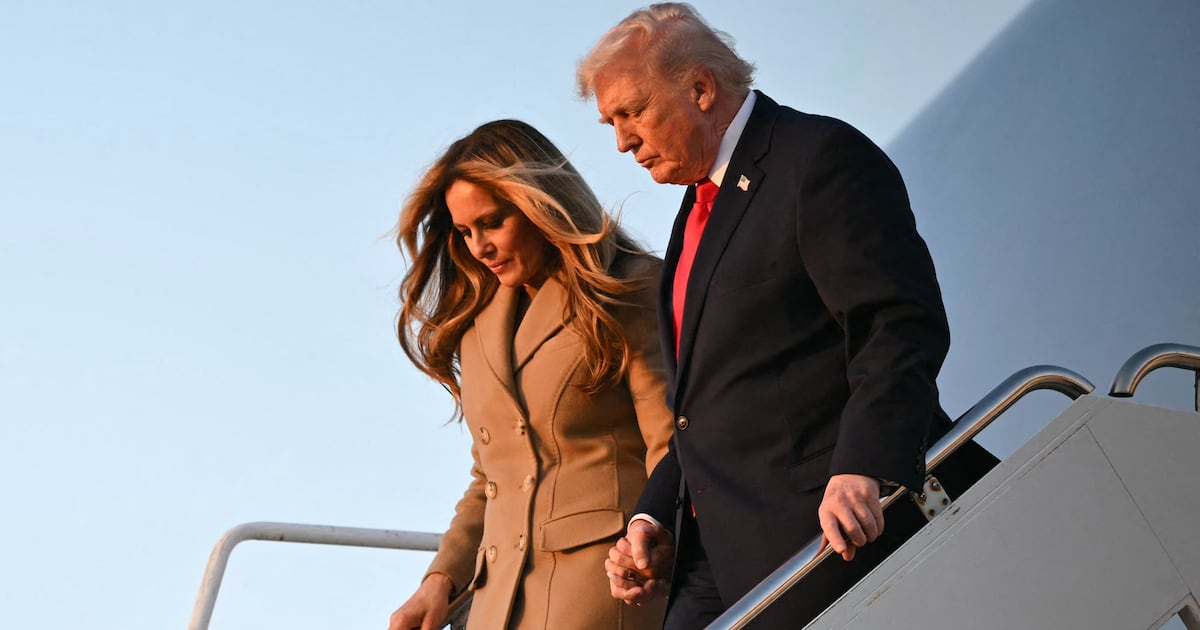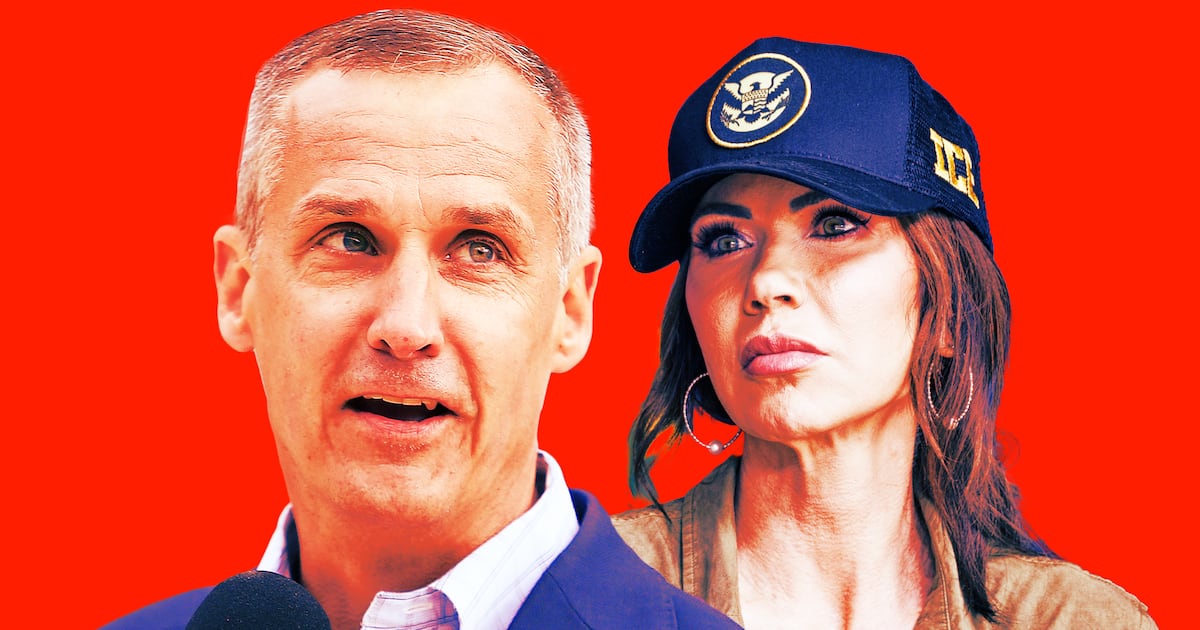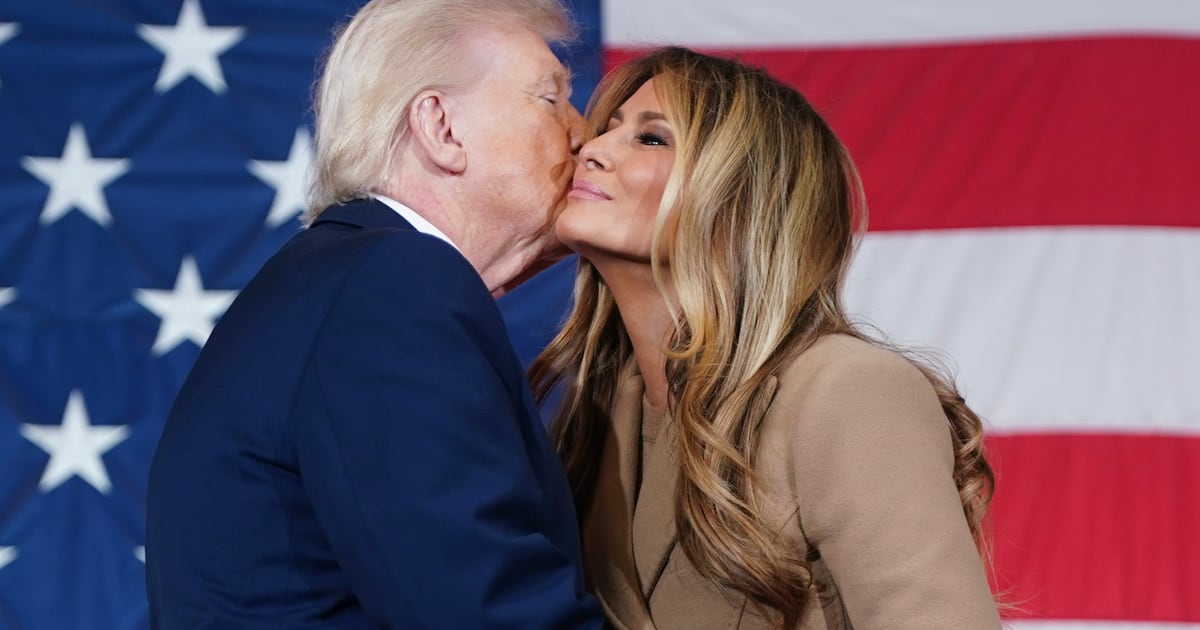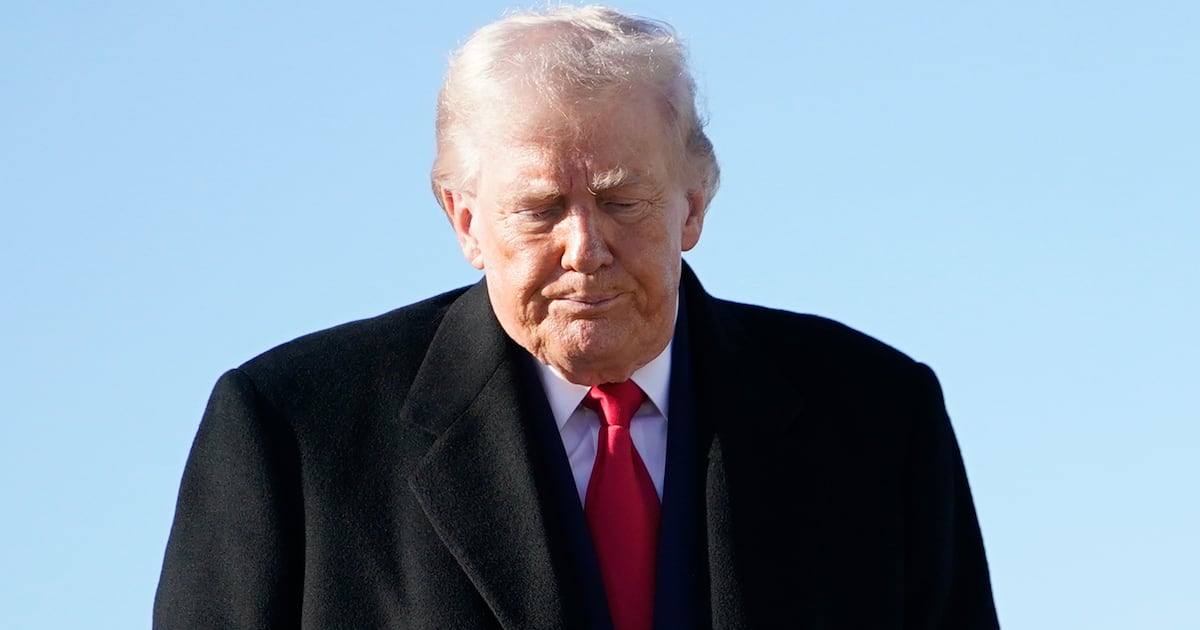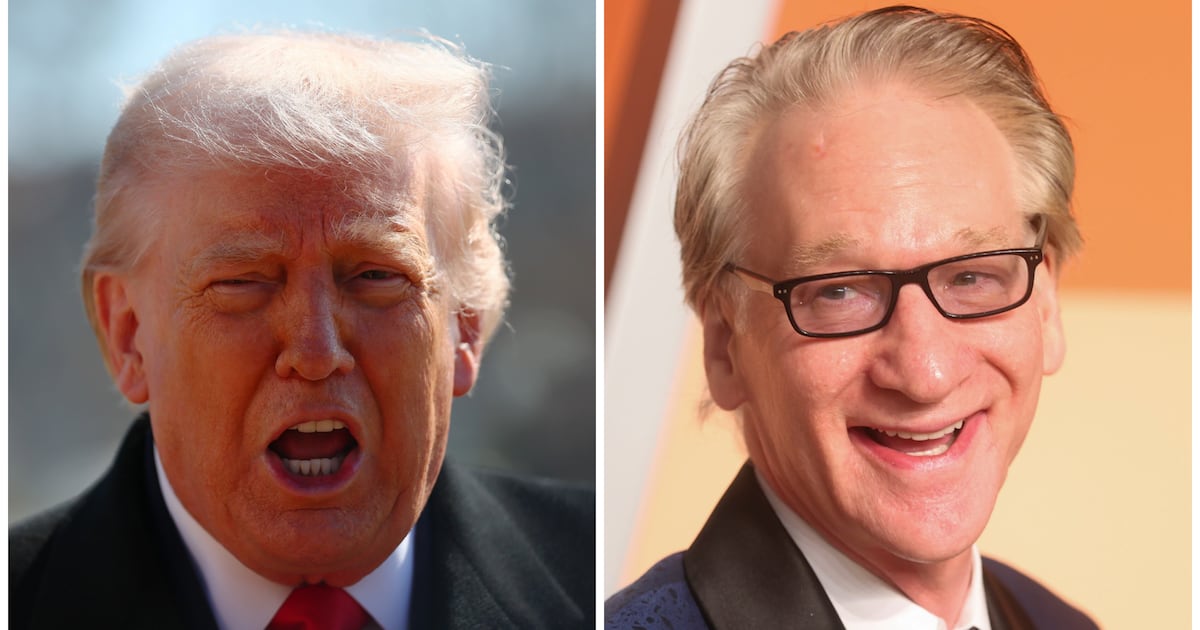On a Saturday afternoon in mid-January, Brett H. Pojunis, the chairman of the Nevada Libertarian Party, stood outside his office on Flamingo Road in Las Vegas, ashing a cigarette and dissing Rand Paul. “We’re the Libertarian Party,” he told me, dramatically stretching out the word in his New York accent. Paul, a member of the Republican Party, was in town for a visit ahead of formally launching his bid for the White House, and Pojunis didn’t particularly care.
“Libertarian,” he said, is now just “a buzzword” for Republicans like the Kentucky senator. If Paul was really so libertarian, Pojunis had some advice for him: “Well, OK then—join the Libertarian Party!”
Pojunis led me inside past some staffers hunched over a computer trying to select a new party logo. “Is this too swastika-y?” he asked, pointing to an image closely resembling the Nazi insignia. We walked past a room cluttered with memorabilia from Baywatch, the 1990s TV show featuring bikini-clad lifeguards, and Pojunis explained that it was the personal office of Michael Burke, the creator of the show and a possible Libertarian Party candidate. “He literally has a key to the Playboy Mansion,” Pojunis said.
Anecdotally, when I’ve talked to Libertarians who identify as Paul supporters—particularly those who campaigned for his father, former congressman and two-time presidential candidate Ron Paul—they acknowledge the reality that Rand Paul may be the best ambassador to the mainstream political world they will ever get. In other words, the senator is not the ideal libertarian (an oxymoronic phrase, given the amount of infighting among libertarians about what exactly that is), but he comes close enough, and certainly closer than any other likely presidential candidate.
But Pojunis and his aides said those Paul supporters were fools. Libertarians who back Paul, he said, are “getting all the downside of compromise and none of the upside.”
Two months ago, there was little reason to think that Nevada’s Libertarian Party, which is considered slightly off the rails even among fellow libertarians, represented anyone other than its own 12,000 members. But some of Paul’s recent foreign policy pronouncements have some libertarians, especially those who gravitated to his father for his steadfast opposition to the war in Iraq and George W. Bush’s hyper-hawkishness, sounding like Pojunis and his fellow Nevada radicals.
The breaking point came on March 9, when Paul was faced with one of the most challenging decisions of his political career.
Sen. Tom Cotton (R-AR) penned an open letter to “the leaders of the Islamic Republic of Iran.” The letter stated, rather condescendingly, that Iranian leaders “do not fully understand our constitutional system.” Soon a new president would be in office, Cotton wrote, and that president could (if Republican, would) “revoke” any executive agreement President Obama signs.
Cotton, a neoconservative beloved by Bill Kristol, editor of The Weekly Standard, one of the most influential organs that supported the invasion of Iraq, opposes U.S. engagement with Iran, and he has previously expressed a desire to halt any dialogue between the two countries over Iran’s nuclear program. “The end of these negotiations isn’t an unintended consequence of congressional action,” Cotton told the Heritage Foundation in January. “It is very much an intended consequence. A feature, not a bug, so to speak.”
Paul has historically favored the negotiations Cotton seeks to stop. In 2012, he objected to new sanctions on Iran. In January, as his likely Republican primary competitors Ted Cruz and Marco Rubio warned of the threat of a nuclear Iran, Paul appeared skeptical. “Are you ready to send ground troops to Iran?” he asked. “Are you ready to bomb them? Are you ready to send 100,000 troops? I’m a big fan of trying to exert and trying the diplomatic option as long as we can. If it fails, I will vote to resume sanctions and I would vote to have new sanctions… But if you do it in the middle of negotiations, you’re ruining it.”
Paul’s position on Iran has always been closer to Obama’s than to that of his fellow Senate Republicans—until March 9, when he joined 47 of his fellow Senate Republicans in signing the letter.
“This is more than a flip-flop. This is a backflip,” Justin Raimondo, the editorial director of Antiwar.com, told me on Wednesday. “This was the last straw. I’ve put up with a lot from that guy! I’ve had to defend him like a Jesuit. I’m done. Let somebody else do it.”
To say Raimondo was a supporter of Paul wouldn’t quite be correct. Raimondo has acted like Paul’s personal bodyguard on the Internet. More often than not, any comment that could be perceived as being remotely critical of the senator was met with a response from Raimondo that was so vitriolic it veered toward cyber-bullying. (When I wrote an article in July making the case that Ron Paul might pose a political problem for Rand Paul, Raimondo called me a “professional sleaze-ologist.” Other times when he was unhappy with my coverage of Paul, he criticized my appearance.)
Now Raimondo acknowledges that he was much like many of the other Paul supporters I’ve spoken to: not entirely satisfied with the senator but willing to tolerate him if it meant hearing some of what Raimondo believed expressed on the national stage. “I thought he was going to start a real debate about foreign policy in this country, and I thought he was a reasonably principled yet pragmatic politician,” Raimondo said. “And now, apparently he’s just a panderer who would do anything to please people who hate him anyway and will continue to hate him no matter what he does—even if he changes his last name.”
Raimondo said he believes the rarified confines of the Senate and the media spotlight Paul has been cooking under have made him lose touch with reality. “He is taking his base for granted,” Raimondo complained. “Here is somebody who is an eye doctor who is suddenly elevated to the Senate. It’s turned him into kind of a megalomaniac.”
“I think he’s counting on the organizational muscle of the Ron Paul groups like the Campaign for Liberty [and] Young Americans for Liberty—but these are libertarians! They don’t take orders from the central committee! It’s like herding cats anyway,” Raimondo said.
The senator claimed he signed the letter to help Obama position himself better during negotiations and to reinforce his position that Congress should have the final say over whether such an agreement with Iran is made. (Paul is a co-sponsor of the so-called Corker bill, which would give Congress the opportunity to vote on the matter.) Paul’s explanation, of course, ignores Cotton’s stated objectives: to kill those negotiations; and to remind the Obama administration that what it does doesn’t matter, because when a new, Republican administration struts into office, it will just undo it.
“It’s curious,” Christopher Preble, the vice president for defense and foreign policy studies at the libertarian Cato Institute, said of Paul’s decision. “There’s a certain level of disappointment and surprise,” he said, but “it’s not unique to libertarians.” The letter as a whole “reveals within the party kind of a departure of the wise and prudent foreign policy of, say, the George Bush 41 administration.” (Paul often cites George H.W. Bush as a major inspiration for his own foreign policy.) Overall, Preblo said, the Iran letter is “just sort of embarrassing.”
Raimondo suggested that Paul’s decision wasn’t just vaguely related to 2016 but to the support of one influential donor in particular: “I don’t want to imply anything,” he said, but, “prior to this, he did meet with Sheldon Adelson…”
On March 4, Paul had a private meeting with the Las Vegas-based casino billionaire, who was visiting Washington to attend the congressional address by Israeli Prime Minister Benjamin Netanyahu, of whom Adelson is a fervent supporter. Adelson’s hobby is toying with presidential politics: During the 2012 election, he spent $93 million on super PACs. His financial backing is so vital that he once got the tough-talking Chris Christie to apologize for offending him at a speech to the Republican Jewish Coalition. (The New Jersey governor had referred to “the occupied territories,” a widely used term for the Palestinian areas of the West Bank that are under Israeli control but one that Adelson finds offensive.) It was not helpful to Paul when The New York Times reported that Adelson was so turned off by Paul’s foreign policy views that he told his associates he might finance a campaign to defeat Paul if the senator catches fire in the Republican primaries. After the early March meeting, Paul assured a Jewish radio program that rumors of Adelson’s hatred of him were untrue.
I asked Doug Stafford, a senior adviser to Paul, whether the meeting with Adelson had any impact on Paul’s decision to sign the letter five days later. “No,” Stafford insisted. “What impacted his decision to sign the letter was he felt it reinforced his co-sponsorship of the Corker bill.”
Stafford maintained that Paul hadn’t flip-flopped or back-flipped. “Rand’s foreign policy doesn’t fit in boxes,” he said. “People want to label him as something, people want to put him in boxes, they try to assign these things. He just doesn’t fit them.”
Jack Hunter, a reliable Paul defender and co-author of his first book, told me: “I don’t necessarily agree with him signing the letter. I guess he has his reasons.” He acknowledged the letter was “perhaps” a departure from the senator’s pro-negotiation position.
Whatever nonsensical thing Paul may say about why he signed the letter, it’s probably true that neglecting to do so would have had serious repercussions in the Republican presidential primary campaign. “It would be very difficult for any of the candidates to avoid signing onto it,” said Rick Wilson, a Republican consultant. “Even somebody like Paul, who knows his dad’s lists are still going to fund a lot of his operation,” Wilson said, knows “it’s a political reality that no one in the Republican Party right now is going to bless” the Obama administration’s position on Iran. Wilson said the debate over the letter would soon pass. “I think the brouhaha is completely centered in the Acela corridor. It’s a media frenzy. This is a D.C.-New York bullshit, circle-jerk process story.”
Bullshit or not, it feels like the Nevada Libertarians were onto something back in January when they warned that Paul’s shape-shifting positions, often too subtle to be branded flip-flopping but nonetheless unsettling to hardcore supporters, would ultimately nudge his libertarian base into a depressive state. “It sounds reasonable [to compromise] in order to win,” said Jason Weinman, the party’s outreach director. “But if you’re compromising and then you’re going to lose anyway, why are you compromising to begin with? Then you lose your whole base.”

